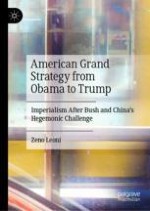2021 | OriginalPaper | Chapter
4. A Post-American Geopolitical World Order: Uneven Development and the Shifting Balance of Power
Author : Zeno Leoni
Published in: American Grand Strategy from Obama to Trump
Publisher: Springer International Publishing
Activate our intelligent search to find suitable subject content or patents.
Select sections of text to find matching patents with Artificial Intelligence. powered by
Select sections of text to find additional relevant content using AI-assisted search. powered by
